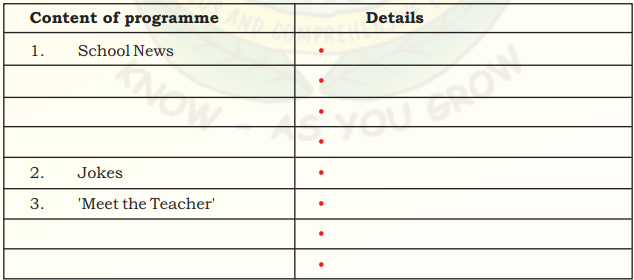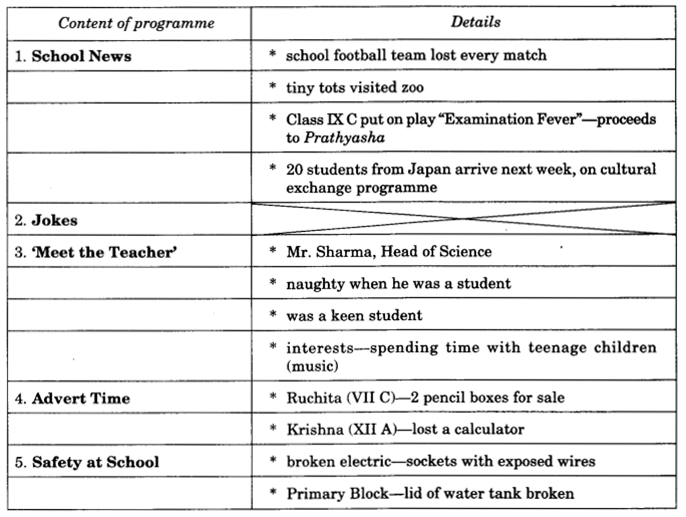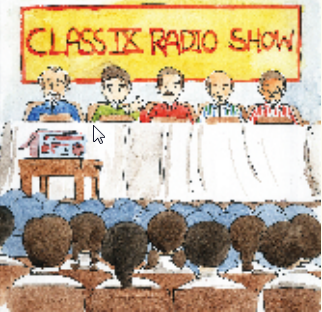NCERT Solutions for Class 9 English Main Course Book Unit 1 Chapter 1 An Exemplary Leader are part of NCERT Solutions for Class 9 English. Here we have given NCERT Solutions for Class 9 English Main Course Book Unit 1 Chapter 1 An Exemplary Leader.
| Board | CBSE |
| Textbook | NCERT |
| Class | Class 9 |
| Subject | English Main Course Book |
| Chapter | Unit 1 Chapter 1 |
| Chapter Name | An Exemplary Leader |
| Category | NCERT Solutions |
CBSE Class 9 English Main Course Book Unit 1 People Chapter 1 An Exemplary Leader
TEXTUAL EXERCISES
(Page 5)
Question 1.
Read the following conversation between two friends.
Answer :
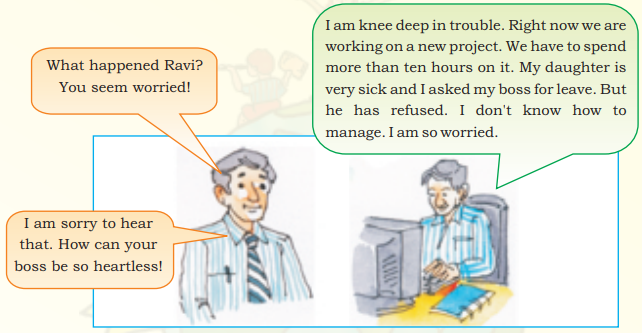
Question 2.
In pairs, discuss the problem Ravi is facing. Do you think Ravi’s boss is right ? Give reasons for your answer. Tick mark the qualities that you feel desirable in a boss.

Answer :
Various answers. For discussion at class level. One answer is as follows :
I think Ravi’s boss is right in his own way and in his official position. After all, the new project can’t be treated casually. But the other side, the human face of the situation, can’t be altogether neglected. Ravi’s daughter needs attention as she is sick. At the most, Ravi should be given some hours’ leave so that he attends to his daughter. In our society medications do work but
inter-personal relations can work wonders. If Ravi’s daughter sees her father, she can get well very soon. The project can be attended to after a few hours’ wait. Also someone can act in place of Ravi or the work Ravi has, that is, to attend to his ailing daughter, can be done by the boss himself.
The qualities desirable in a boss are and should be : trustworthy, problem-solving, oratory skills, ability to take decisions, willing to take risk.
Question 3.
An e-mail, short for electronic mail is a store and forward method of composing, sending, storing, and receiving messages over electronic communication systems. It is the quickest way to communicate in writing.
E-mail messages consist of two major sections :
Answer :
1. Header consisting of – subject, sender, receiver, date and time.
2. Body which contains the message. It can be a formal / informal letter depending on the purpose.
Study the following tips on composing e-mails :
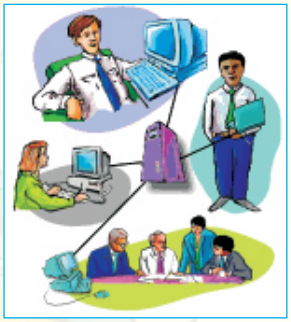
Subject :
- It should be brief
- It should give a clue to the content of the message
- It need not be a complete sentence
Salutation :
Dear Sir / first name of the person
Opening statement :
- Begin with a pleasantry or greeting
- When replying to a message – Thank you for your message / I received your message
Clarity and tone :
- When you expect a reply – ‘Please let me know’
- When you want help – ‘Please’ or ‘Kindly’
Paragraphs :
- Each main idea should be in a separate paragraph, making it easy for the reader to understand the message.
- Use complete sentences (no SMS language)
Complementary close :
- Regards / love
- Name
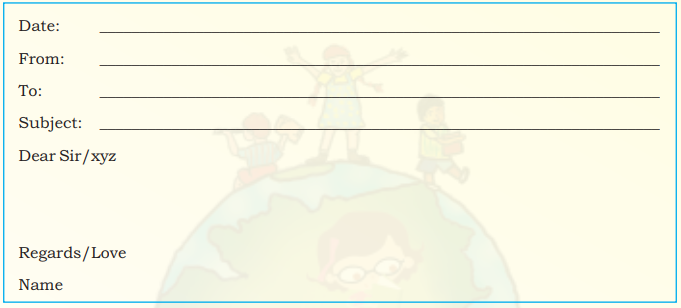
Question 4.
Think of an occasion when you led a team for a competition. Were you successful ? Did you exhibit any of the qualities given in A.2. ? If so, to what extent were these qualities exhibited and how
did it lead to your success ? Through an e-mail, share your experience with a friend.
Answer :
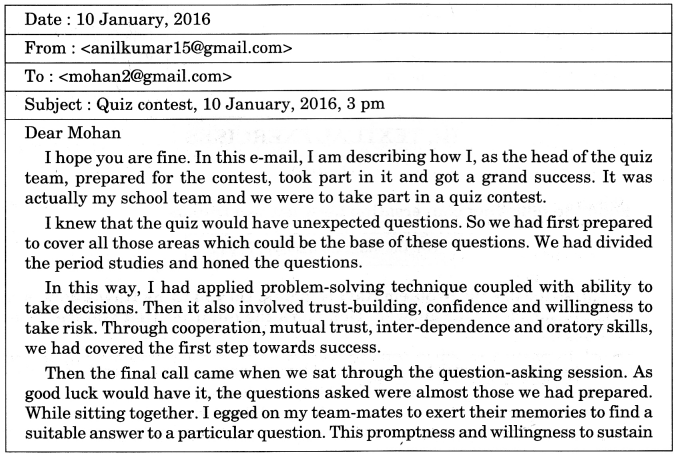

Question 5.
Read a short story about an exemplary boss.
Answer :
Working 12 to 18 hours a day was not uncommon for scientists at the rocket launching station, Thumba. A group of such scientists was frustrated due to the work pressure and meeting their boss’ demands; however, they were loyal to him.
One day, a scientist gathered enough courage to go up to his boss and say, “Sir, I have promised my children that I will take them to the exhibition this evening. Therefore, I have to leave the office at 5.30 pm. Can I leave early today, Sir?” His boss replied, “Alright. You may leave early today.” The scientist was happy for having received the permission and went on to
continue his work. He stayed on to work after lunch, and, as always, got so engrossed in his work, that he peered at his watch only when he thought he was done. Unfortunately, it was past 08:15 pm.
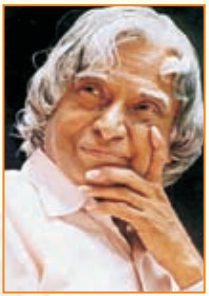
With a jolt, he remembered his promise to his children. He looked for his boss who was not in his office. Having told him just that morning, he wrapped up work and hurried home. As he drove home, he felt very guilty for having let his children down. When he reached, the children were not at home. His wife was busy reading. He felt that initiating any conversation with her would only add fuel to fire, so he stayed quiet. Looking up at him, his wife asked, “Do you want something hot to drink or have dinner right away?”
The man could only ask, “Where are the children?” His wife said, “Don’t you know? Your boss came here at 5.15 pm and took the children to the exhibition you had promised to take them to.” He was surprised, but, it did not take him too long to guess what had happened. The boss who granted him permission had observed him working very seriously well past 5.00 pm He must have thought that the scientist would not leave the work half done, but if he has promised his children a visit to the exhibition, then they deserve it. So, he took the lead in taking them to the exhibition himself. The boss does not have to do it every time. But once it is done, loyalty is established. No wonder, all scientists at Thumba continue to work under this boss in spite of the great pressure. This boss was none other than Dr APJ Abdul Kalam.
Question 6.
Following are eight incidents from the story but their order is mixed up. Put them in the right sequence.
(a) The scientist rushed home anticipating the disappointment of his children.
(b) Scientists were working for 12-18 hours at Thumba.
(c) The boss consented.
(d) Scientists had heavy work pressure but they were loyal.
(e) A scientist approached the boss for permission to leave at 5.30 pm to take his children to the exhibition.
(f) To his surprise, he learnt that his boss had kept his appointment for him.
(g) Suddenly, he remembered his promise to his children.
(h) The scientist became so engrossed in his work that he continued working till 8.15 pm.
Answer :
The proper order would be :
(b) Scientists were working for 12-18 hours at Thumba.
(d) Scientists had heavy work pressure but they were loyal.
(e) A scientist approached the boss for permission to leave at 5.30 pm to take his children to the exhibition.
(c) The boss consented.
(h) The scientist became so engrossed in his work that he continued working till 8.15 pm.
(g) Suddenly, he remembered his promise to his children.
(a) The scientist rushed home anticipating the disappointment of his children.
(f) To his surprise, he learnt that his boss had kept his appointment for him.
Question 7.
When we talk about people, we discuss their qualities. The box below contains some words which best describe people.

Work in pairs and select the appropriate words for the following characters.
Answer :
To work in pairs at class level.


Question 8.
A story can have more than one ending. Rewrite the end of the story you have just read. You can begin like this “As he drove home, he felt guilty for having let his children down. He reached home, entered the house and saw his wife and children watching the television ….”
Answer :
… As he sat by their side, he looked at them with a guilty feeling on his face. As he was about to express his regrets over not having kept his promise, the little daughter came to him and sat in his lap. Then she spoke, “Papa, do you know who took us to the exhibition ? Uncle came to us and drove us himself to the exhibition. He served us ice¬cream and told a very good story about our great country.” The scientist felt that his eyes were getting wet due to the gratefulness towards his boss.
Question 9.
Listen to a speech by the honourable former President of India, Dr AP J Abdul Kalam, on his ‘Vision for India’. While listening, fill up the following details.
(a) The following countries captured our lands and conquered our minds ……….
(b) His first vision is that of ……….
(c) His second vision is ……….
(d) The three scientists who worked with him at ISRO are ……….
(e) India leads in ………. and is the second largest producer of ……….
Answer :
(а) Greece, Turkey, Portugal, Britain, France.
(b) freedom
(c) of development
(d)
- Dr. Vikram Sarabhai
- Prof. Satish Dhawan
- Dr. Brahm Prakash
(e) Remote Sensing Satellites, ………. rice
Question 10.
The Process of Writing : CODER
In your written work, it is advisable to follow the process outlined below. (We call it ‘CODER’-Collect your ideas ; Organise your ideas ; make your first Draft ; Edit your work ; Revise your
work.)
1. C-Collect your ideas :
Working in groups, recall and jot down the opinion that the ‘scientist’ formed of his boss in A.5.
2. O-Organise your ideas :
(a) Now work in pairs. Choose one or two opinions about the boss that you feel quite strongly about, or agree with.
(b) Also, note down the opinion that you prefer about the scientist.
3. D-make your first Draft :
Write the description individually. You may refer to some of the words in the boxes in

And

Note : At this stage of your course you should not worry about the language and tone of a formal description.
4. E-Edit your work :
Now exchange your description with your partner, and suggest improvements in grammar, spelling, punctuation etc.
5, R-Revise your work :
Rewrite your speech and check it carefully, before handing it to your teacher.
Answer :
1. Working in groups at class level :
The scientist formed a very good opinion about his boss. He got the boss’s permission and went on to continue his work. He found him kind-hearted, unassuming, sympathetic and sagacious.
2.
(a) To be done at class level in the form of discussion to agree with on these qualities.
(b) The scientist is disciplined, laborious, intelligent and a workaholic. He is laborious, thoughtful, diligent and sagacious.
3. Students to work on the lines given here. They may take clues from the above.
4. The written description to be exchanged with the partner and improvements to be suggested including errors in grammar, spelling, punctuation etc.
5. The speech may go on like I as the following :
Worthy teacher, Sir and dear students As you know, I am going to relate my impression about the boss. I lack words in describing the impression about him. The boss is all human love, compassion, cooperation, fellow-feeling, both as a boss, as a colleague and a human being.
He has understanding and geniality. He, as a boss, knows his duties and responsibilities. He has a clear vision of how to take work from his peers and subordinates. He has a human side which has no parallel. Truly he mixes his humanism with the work ethics. He takes care of the scientist’s children as his own children and this steals the show in his favour. He emerges a great,
rather a super human being, who handles his responsibilities with a human and humane face.
How delighted the scientist is when he comes to know what his boss has done for him ! The boss is not alone but is the head of his own family of scientists in the organisation.
Question 11.
Now, using the ideas given below, write a speech on “The Role of Youth in Realising the Dreams of Dr Kalam”(Refer to CODER)
- fighting for equal rights
- fighting corruption
- empowering the masses
- looking for jobs within the country
- active involvement in social issues
- promoting national integration
- equal participation of women in all fields
Answer :
Students to refer to CODER on their own as required. The speech is given below :
The Role of Youth in Realising the Dreams of Dr. Kalam Respected Principal, teachers and dear friends I, Rahul, am before you to speak on the role of youth in realizing the dreams of Dr. Kalam. I personally feel that the youth are the reservoir of energy and with that they can make the country
great. They can use their energy in solving various social problems and can uplift the masses. You all will agree with me that corruption has spread like white ants in our society. They can eliminate it from the society by exposing the corrupt officials. They can fight against this by joining heads together following the teachings of Mahatma Gandhi. After getting education, they can seek jobs within the country. Social inequalities and discrimination are in plenty. These are the evils of the society which hamper the growth of the country. Students, too, can remove these by involving them in these social issues.
Superstitions, narrow-mindedness, blind beliefs eat the inner side of the society. Illiteracy and religious fanaticism rule. These can be dealt with properly by the youth by empowering the masses. Equally, the youth can cleanse up the society of its evils in a concerted way by joining together for good causes.
I personally feel that women are a neglected lot in the rural India. They are ill- treated and live like bonded labour. The youth can identify their problems in a proper manner. They can work for their equal participation from the grassroot levels to the top one. Female foeticide, today, is the greatest evil. It is likely to threaten the very basis of human existence. You all can imagine what will happen if there are not females equal to the number of males. The youth can stand against this female foeticide. The youth can remove all these evils from the society. They can work for the national integration. It shall be a true service to the dreams of Prof. APJ Abdul Kalam. Thanks a lot.
We hope the NCERT Solutions for Class 9 English Main Course Book Unit 1 Chapter 1 An Exemplary Leader help you. If you have any query regarding NCERT Solutions for Class 9 English Main Course Book Unit 1 Chapter 1 An Exemplary Leader, drop a comment below and we will get back to you at the earliest.
















